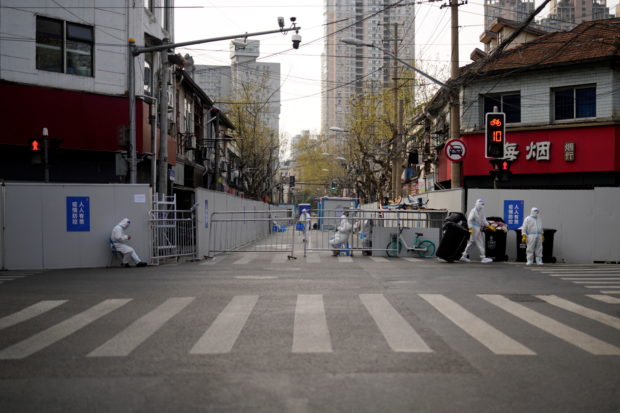Shanghai expands COVID lockdown as new daily caseload surges by a third

Workers in protective suits keep watch at a sealed-off area following the coronavirus disease (COVID-19) outbreak in Shanghai, China March 30, 2022. REUTERS/Aly Song
SHANGHAI — Authorities began locking down some western areas of Shanghai two days ahead of schedule, as new COVID-19 cases in China’s most populous city jumped by a third despite stringent measures already in place to try to stop the virus spreading.
Home to 26 million people, China’s financial hub is in its third day of a lockdown officials are imposing by dividing the city roughly along the Huangpu River, splitting the historic centre west of the river from the eastern financial and industrial district of Pudong to allow for staggered mass tests.
While residents in the east have been locked down since Monday, those in the west were previously scheduled to start their four-day lockdown on Friday.
Locking down a major metropolis like Shanghai full-scale would result in a 4% reduction in the national real gross domestic product, economists at the Chinese University of Hong Kong, Tsinghua University and other institutes estimated in mid-March.
On Wednesday Shanghai reported a record 5,656 asymptomatic COVID cases and 326 symptomatic cases for March 29, up from 4,381 new asymptomatic cases and 96 new cases with symptoms for the prior day. China reclassifies asymptomatic cases if and when they later develop symptoms.
Several residents living in western districts on Tuesday received notice from their housing committees that they would be stopped from leaving their compounds for the next seven days.
“We will resume normal life soon, but in the next period of time we ask everyone to adhere closely to pandemic control measures, do not gather, and reduce movements,” said one housing committee notice seen by Reuters.
Meanwhile the city’s southwestern district of Minhang, home to more than 2.5 million people, said it would suspend public bus services until April 5.
Shanghai authorities told a press conference on Wednesday that since the lockdown began on Monday they had conducted 9.1 million nucleic acid tests.
They also said they were starting to disinfect places such as office buildings, construction sites, wet markets and schools in a month-long campaign.
Business life has already been seriously disrupted.
The lockdown has roiled auto production in the city as two major components suppliers, Aptiv and Thyssenkrupp joined Tesla in shutting plants due to COVID control measures.
Meanwhile Chinese firms have halted a wave of planned domestic initial public offerings, filings show, as the current case surge hampered due diligence and information gathering – affecting an estimated $9 billion-plus in fundraising.
The Shanghai government said on its official WeChat account late on Tuesday that those who refused to comply with nucleic acid testing could be found legally liable. It also warned it would crack down on any price gouging, after people rushed to stock up on food and medical items in anticipation of the lockdowns.
Across mainland China, the daily numbers of new local infections in the past two weeks were much higher than those seen in the first two months this year, marking the biggest case wave since the 2020 one centred on Wuhan.
The eastern city of Xuzhou, which reported a total of less than 20 local infections in the past week, has imposed a three-day lockdown in most areas starting Wednesday.
The Xuzhou government said each household in those areas should only send one person to go out to shop for necessities every other day, while non-essential companies should either shut operation, have employees work from home, or operate in a closed-loop manner.
For more news about the novel coronavirus click here.
What you need to know about Coronavirus.
For more information on COVID-19, call the DOH Hotline: (02) 86517800 local 1149/1150.
The Inquirer Foundation supports our healthcare frontliners and is still accepting cash donations to be deposited at Banco de Oro (BDO) current account #007960018860 or donate through PayMaya using this link.